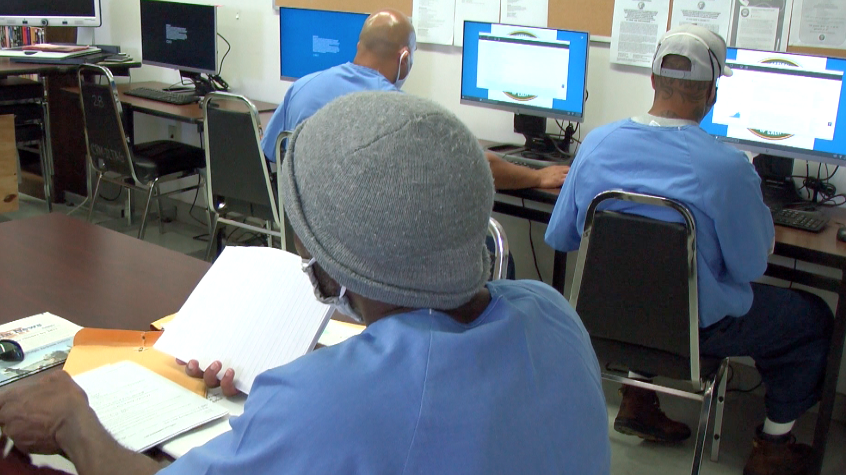
Source: Daily Breeze
Dozens of people incarcerated in California state prisons will now have the opportunity to obtain a master’s degree from Cal State Dominguez Hills.
The California Department of Corrections and Rehabilitation and CSUDH have teamed up to offer a master’s degree in humanities for incarcerated individuals – called the HUX program – starting this fall. It marks the first graduate degree program provided through a partnership between the agency and a state university, officials say.
The fall 2023 cohort includes 33 students from 11 different prison facilities across the state, including Folsom State Prison, San Quentin State Prison and Chuckawalla Valley State Prison.
“This amazing graduate program with Cal State Dominguez Hills really is the next step,” Shannon Swain, superintendent of CDCR’s Office of Correctional Education, said recently. “Because to my thinking, at least we need to meet students where they are in their educational journey and help them get where they want to go.”
Every one of the state’s 33 prisons are equipped with an accredited adult school, which enables incarcerated folks to acquire basic and technical education. The courses were designed for students earning a high school diploma or GED, Swain said.
CDCR has also been working with community colleges to offer transferable associate degrees to those behind bars. Then in 2016, Cal State Los Angeles became the first public university in the state to provide a bachelor’s degree program to incarcerated individuals.
Over the years, more universities have signed up for this program, including San Diego State University, which enrolls students from Centinela State Prison, and UC Irvine, which has been helping incarcerated individuals at the Richard J. Donovan Correctional Facility obtain bachelor’s degrees.
“We’re really focused on higher education,” Swain said, “and making sure that college opportunities are there.”
Incarcerated individuals who participated in correctional education programs were 43% less likely to return to prisons than those who did not, according to a research from RAND Corporation, a global policy think tank. They were also 13% more likely to get a job after release.
“Correctional education is extremely cost effective, it reduces recidivism and it’s so much less expensive than building prisons,” Swain said. “And then of all of the correctional education opportunities or options, college is by far the most impactful. So it just makes sense.”
Nine out of 33 prisons in the state now have a bachelor’s degree opportunity available, Swain said. In addition, there are around 13,000 incarcerated students every college semester.
“We had students earning their bachelor’s degrees starting to graduate,” she said, “and wanted to make sure we had the next level of opportunity available.”
The master’s degree program at Cal State Dominguez Hills will allow any incarcerated individuals within CDCR who already have a bachelor’s degree and a GPA of at least 2.5 to apply. The two-year program will focus on areas such as religion, morality and spirituality, perspectives on punishment and urban development.
“It’s important that we have aspirational possibilities for students who are incarcerated,” said CSUDH program Director Matthew Luckett. “I think that’s one of the trends that we’ve seen and one of the major developments that we’ve seen in incarcerated education.”
Students will complete their coursework using secure laptops. They will also have the opportunity to work one-on-one with CSUDH professors through video calls and/or written correspondence.
“We want to empower our students to be able to communicate, think judiciously, analyze and understand evidence,” Luckett said, “and we believe that those are skills that would help them in the job market.
“But I think just as important as that,” he added, “is that we’re training leaders, we’re training advocates, we’re training students to go back into their communities and advocate for change, lead for change, and ultimately make the kinds of futures that they want.”
The program, however, is not free. It costs around $10,500 and will be paid for by students and/or their support persons.
The new partnership with CDCR resurrects the HUX program, which Cal State Dominguez Hills first established in 1974 but which closed in 2016 because of declining enrollment. It was rebooted to resume its mission of helping incarcerated students with support from CDCR.
The program was one of the pioneering correspondence programs in the country in the humanities, Luckett said. It had more than 5,800 graduates over the course of 40 years.
“The legacy HUX program was fundamentally, I think, ill equipped to evolve in the way that it needed to evolve with the explosion of online programming and digital learning options,” Luckett said. “And so I think we had to go back to the drawing board a little bit in terms of course delivery.”








